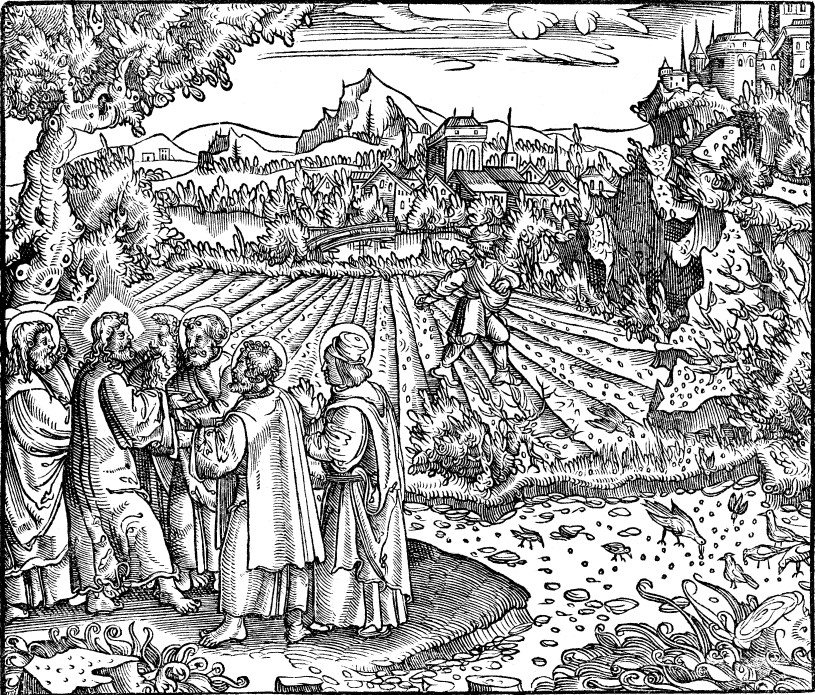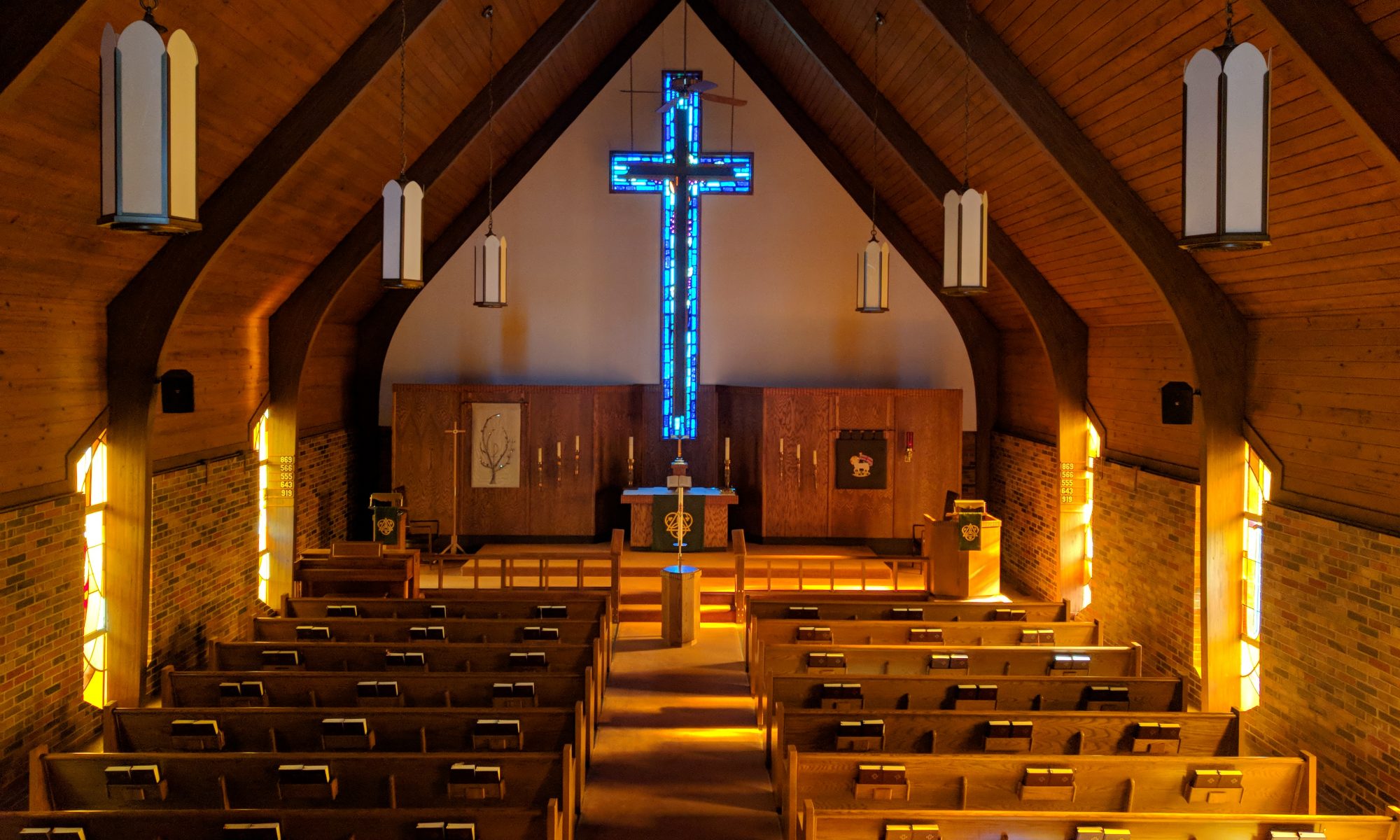
Lessons: Isaiah 55:10-13, 2 Corinthians 11:19-12:9, Luke 8:4-15
Hymns: LSB 589, 823, 578, 758, 923
Grace, mercy, and peace to you from God our Father and our Lord and Savior, Jesus Christ. Amen.
In our bulletins above the opening hymn, you will see a Bible verse that matches the theme found in our Scripture readings. I receive these verses from a book called Planning the Service that gives hymn suggestions and helps for each Sunday in the Church Year. It is my prayer that you have benefited from reading these Bible verses as you open your bulletins. This Sunday’s verse says, “Today, if you hear His voice, do not harden your hearts” (Psalm 95:7-8). It matches our Gospel reading remarkably well. Drawn from Psalm 95, much of this psalm is sung at Matins, but not these verses. Psalm 95 begins, “Oh come, let us sing to the Lord; let us make a joyful noise to the rock of our salvation! Let us come into his presence with thanksgiving; let us make a joyful noise to him with songs of praise! For the Lord is a great God, and a great King above all gods” (Psalm 95:1-3). It is a psalm of praise, acknowledging the wonderful things God has done for us, who we are, and our response for God’s mercy. In Matins right after singing, “Oh come, let us worship and bow down; let us kneel before the Lord, our Maker! For he is our God, and we are the people of his pasture, and the sheep of his hand” (Psalm 95:6-7), we are used to singing the Gloria Patri. But the psalm continues with, “Today, if you hear his voice, do not harden your hearts, as at Meribah, as on the day at Massah in the wilderness, when your fathers put me to the test and put me to the proof, though they had seen my work. For forty years I loathed that generation and said, ‘They are a people who go astray in their heart, and they have not known my ways.’ Therefore I swore in my wrath, ‘They shall not enter my rest’” (Psalm 95:7-11).
In these verses that I just read, twice we heard a word that was also spoken twice in today’s Gospel: heart. Hearing the Word is the opposite of hardening one’s heart. A hard heart will not listen to God. Pharoah had a hard heart when Moses tried to get him to let the Israelite people go. Many today have hard hearts—unwilling to listen to God’s Word. Some are simply uninformed; they have no idea what Christianity is all about. Others have walked away from the Lord through impenitence or unbelief.
Drawing from the theme verse, “Today, if you hear his voice, do not harden your hearts” (Psalm 95:7-8), we hear of four kinds of hearts in today’s Gospel—the hardhearted, the fainthearted, the halfhearted, and the truehearted. When Jesus explains the Parable of the Sower, He uses the word “heart” to explain what the first and last examples mean.
In the Parable, Jesus teaches that the seed is the Word of God. The Word falls all over the place—on the path, on rocks, among the thorns, and in good soil. No farmer would allow his seed to be wasted in this way. Given that it is expensive and it will only grow in good conditions, the wise farmer will make sure the seed is planted in the right places under the right conditions. God, however, does not do such calculating when it comes to His Word. He wants all to be saved and to come to the knowledge of the truth (1 Tim. 2:4). He wants all to have the opportunity to hear the Word and be saved by it. And so, He commands that His Word be preached to all the nations (Matt. 28:19-20). In fact in the Parable of the Great Banquet, Jesus teaches that the poor, the crippled, the lame, and the blind who are in they alleys, highways, and hedges of the city are to be preached the saving Gospel to bring them in (Luke 14:21), for the invitation of the saving Gospel also belongs to them. Jesus received tax collectors, prostitutes, and other sinners as He called them to repentance and forgave them of their many transgressions (Luke 15:1-2).
The fainthearted and the halfhearted are where many losses take place in the Church. Temptations pull people away from Christ. Or the cares and riches and pleasures of life tear them away. We are all faced with temptation. We all have various cares that keep our thoughts focused on earthly things. Most Americans have many riches. And we all have various pleasures or desires that seek our attention.
What’s the antidote so we don’t fall away? Satan not only leads us into these temptations or distractions, but then he tries to use them to tear us further away from our Savior. Satan tries to get us to look inward to see if we can have any hope. He wants us to say, “Look at all your temptations! No way you can be a Christian!” Or “Look at how many earthly pleasures you have! That is not an indication of a true Christian who is to take up his cross and follow Jesus!” By doing this, Satan is trying to drive us to despair. He wants us to walk away from our Good Shepherd. He wants us to feel cornered or isolated.
But Jesus will not leave us or forsake us. He is present among us. He comes to us with His grace. He showers us with His gifts. He feeds us His Body and Blood. Jesus added us to His family through Baptism. He shepherds us as members of His flock. He laid down His life for us so that we receive eternal life and salvation. The antidote is in Christ. He shepherds us through His Word, applying to us His victory.
Those who had previously been hardhearted, fainthearted, or even halfhearted have become truehearted as the Word of God takes root in His people. The Holy Spirit is not absent as God’s Word is proclaimed, but the Holy Spirit is present to accomplish God’s will. It is as the prophet Isaiah wrote, “As the rain and the snow come down from heaven and do not return there but water the earth, making it bring forth and sprout, giving seed to the sower and bread to the eater, so shall my word be that goes out from my mouth; it shall not return to me empty, but it shall accomplish that which I purpose, and shall succeed in the thing for which I sent it” (Isaiah 55:10-11).
This is such a comfort to know that God would even care about us mortal sinners, that He would want to shower us with His saving Word, and that He accomplishes what He pleases through His Word. I think sometimes when reading the Parable of the Sower, some try to see what kind of soil they may be. They are trying to figure out where they may stand along the spectrum. In some respects, we must do this. After all the Scriptures teach us to make our calling and election sure (2 Peter 1:10). That is, we are to be confident that we stand before God acquitted. How do we gain this confidence? We don’t gain it by our attempts to do good works, but we gain it as we spend time in God’s saving Word. Through the testimony of Christ, He sustains us unto the end, counting us as His blameless children (1 Cor. 1:4-10). After all, the Holy Spirit is at work to bless through His Word. He turns our hearts of stone into hearts of flesh which receive the riches of God in Christ Jesus (Ezekiel 36:26). These blessings are ours because our Savior went to the cross, being blamed for our many sins and atoned for them through the offering of His Blood as the payment for our sins.
When figuring out where we may stand before God through the various kinds of ground in Parable of the Sower, we must not think that we are in a fixed place and nothing can change. Those who are on good ground may find themselves in places of temptation or become choked by the weeds. Those who are hardhearted can still be softened to receive the saving Gospel.
Our society is strange these days on what is fluid and what doesn’t change. They make gender out to be a fluid thing, that those born male can make themselves think they are female using destructive drugs and surgeries. Ironically, they must use such medical care to change what they think is fluid. On the other hand, if a man struggles with homosexual thoughts, he is labeled as such and society says that he must accept his identity and that it cannot be changed. Psychological care used to help people who were struggling with same-sex attraction. Now psychologists say those people are born that way and must accept it as their identity. That is to say there’s no fluidity there. Such hypocrisy we see. How can gender be fluid and changeable, but attraction cannot be? There’s clearly a war going on in our times over the God-given human body. The prevailing mindset in our culture is destructive, and we must resist their lies. We must point out their logical inconsistencies as I just did, and we must contend against their ideologies as contrary to God’s created order and His life-giving Word. People are not victims of their bodies. They are sinners in need of grace. They can be shown mercy without affirming sin. They can be shown love without allowing them to harm themselves. They can be shown how to truly walk with Christ as a fallen sinner but restored saint in this crazy world as they receive from Christ His righteousness. That is, they can be shown God’s truth, which as Jesus said in today’s Gospel, “As for that in the good soil, they are those who, hearing the Word, hold it fast in an honest and good heart” (Luke 8:15).
But who really has an honest and good heart? None of us do by nature. As Gen. 6:5 states, God sent the Flood when He “saw that the wickedness of man was great in the earth, and that every intention of the thoughts of his heart was only evil continually.” We cannot do enough good works to achieve a good heart on our own. Instead, honest and good hearts are achieved by God through His Word. You see, when we are baptized into Christ and are covered with His righteousness, we are counted as being righteous. That is, we are good, for God credits us with having good hearts. An honest heart is one of faith. When God’s Word has its way with us, the Holy Spirit is working faith in us. We walk by faith. We trust in God’s true Word. We have hearts that cling to the honest and trustworthy Word. This is the way of the truehearted. And it brings forth fruit a hundredfold—all because Christ Jesus is at work in us. Amen.
The peace of God which passes all understanding keep your hearts and minds in Christ Jesus to life everlasting. Amen

